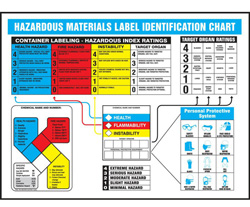



Find all of your laboratory and workplace safety supplies at Safety Emporium!
 STP |
 Glossary Index |
 Swiss Poison Class |
| MSDS Topics |
Free Sites | FAQ's | Regulations | Glossary | Software | Suppliers |
| Books | Forum | Poll | Fun stuff | Quiz | Store | |
| Understand your MSDS with the MS-Demystifier | Search ALL our MSDS info | |||||
A stupor is a state where one has a markedly reduced response to stimuli. The victim is still conscious and can make voluntary movements. Some synonyms include "being in a daze", "decreased consciousness", and "feeling lethargic".
Stupor has a number of causes - head injuries, a heart attack, infections, drugs etc. See the links under Further Reading for more exhaustive lists.
Stupor often precedes a state of unconsciousness or prostration. People in a stupor lack coordination and may injure themselves.

Keep informed about workplace hazards with proper labeling techniques and safety posters available from Safety Emporium.
This term usually appears on Section 10 (stability and reactivity) of a Safety Data Sheet as a symptom of over-exposure. Many chemical vapors can induce dizziness, light-headedness or stupor following inhalation. At higher concentrations, exposure can cause coma or death. It is important to recognize when you (or your coworkers) are becoming impaired from exposure to chemical vapors so you do not pass out before removing yourself to fresh air.
Stupor may also arise from skin exposure or ingestion. As always, read the Safety Data Sheets of the chemicals you work with so you know the symptoms of exposure and take proper precautions to avoid exposure in the first place.
See also: Carbon monoxide, coma, IDLH, prostration
Additional definitions from Google and OneLook.
Entry last updated: Monday, January 16, 2023. This page is copyright 2000-2025 by ILPI. Unauthorized duplication or posting on other web sites is expressly prohibited. Send suggestions, comments, and new entry desires (include the URL if applicable) to us by email.
Disclaimer: The information contained herein is believed to be true and accurate, however ILPI makes no guarantees concerning the veracity of any statement. Use of any information on this page is at the reader's own risk. ILPI strongly encourages the reader to consult the appropriate local, state and federal agencies concerning the matters discussed herein.